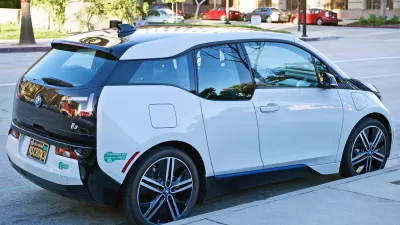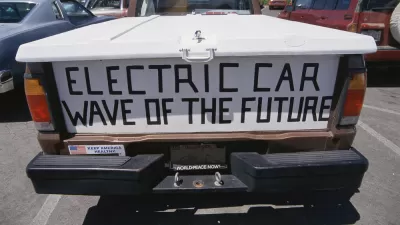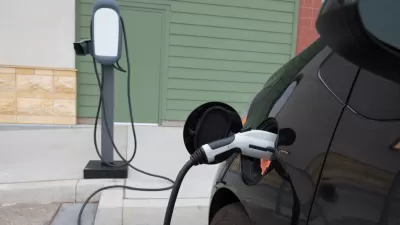The Los Angeles Times editorialized in support of legislation that is expected to be introduced next year to ban sales of internal combustion engine passenger vehicles, though they didn't suggest a date when the ban should become effective.

"It has become clear that the free market is not working fast enough to wean us from our dependence on fossil fuels to power our cars and trucks, which account for more than 10% of man-made greenhouse gas emissions," writes the editorial staff on Nov. 1. They are downplaying the contribution of transportation emissions in California, though, where it is responsible for 39 percent of greenhouse gas emissions according to the Air Resources Board's California Greenhouse Gas Emission Inventory - 2017 Edition released last June (and posted here).
Even as temperatures rise year after year, and as the nation gets victimized by more and larger hurricanes, droughts and wildfires, consumers buy ever more gas-guzzling SUVs and pickup trucks and put in more miles on the road.
Emissions feebate alternative
There are market-based ways to increase sales of fuel-efficient and zero emission vehicles (ZEVs) and reduce sales of gas-guzzling SUVs. Emission feebates, used by the Netherlands, United Kingdom and Singapore, was studied by the University of California (Berkeley, Davis, and Irvine campuses) for the California Air Resources Board in 2010.
These programs add a surcharge to guzzlers and award low and/or zero-emission vehicles a rebate. However, many European and Asian nations have recently adopted or advanced policies to ban internal combustion engine (ICE) passenger vehicle sales by targeted dates:
- Netherlands: 2025
- Norway: 2025
- India: 2030
- Germany: 2030
- France: 2040
- Great Britain: 2040
- China (uncertain)
Auto manufacturers have taken notice of the movement away from petroleum. Volvo was the first to announce the shift toward electric vehicles (EVs) last July, and even General Motors has jumped on board, reported Alex Davies, Wired's transportation reporter, last month.
General Motors believes the future is all-electric,” says Mark Reuss, the company’s head of product. “We are far along in our plan to lead the way to that future world.”
Setting a target date to enact the sales ban
"Is 2030 the right deadline? Or 2040? Or sooner?" asks the editorial board. "We’ll leave that to the experts, though the goal must be to get us there as quickly as is reasonable."
Assemblyman Phil Ting (D-San Francisco), a clean energy advocate, has set a date, 2040, in legislation he plans to introduce when the legislature reconvenes in January, reports Rob Nikolewski, energy reporter for The San Diego Union-Tribune on Oct. 27, though the specifics haven't been written yet.
According to a post last month, the legislation could have the support of Gov. Jerry Brown who has eyed the overseas ICE bans and wondered, "why not California?"
Long ways to go
"About 2 million new cars are sold each year in the Golden State but only about 5 percent meet the state government’s definition of a zero-emission vehicle, adds Nikolewski.
Gov. Jerry Brown has set a goal of 1.5 million clean-energy vehicles on California’s roads by 2025. A little more than 334,000 have been sold in the state thus far.
Ting's current bill
A Ting-authored bill introduced this year, Assembly Bill 1184, would have dramatically increased the rebate amount for eligible electric vehicles by drawing disproportionately from the state's cap-and-trade revenue. It passed the Assembly this year and "will be taken back up in the upcoming session," notes Nikolewski.
FULL STORY: Editorial: If California insists on keeping its car culture alive, it needs to do so without fossil fuels

Planetizen Federal Action Tracker
A weekly monitor of how Trump’s orders and actions are impacting planners and planning in America.

Maui's Vacation Rental Debate Turns Ugly
Verbal attacks, misinformation campaigns and fistfights plague a high-stakes debate to convert thousands of vacation rentals into long-term housing.

Restaurant Patios Were a Pandemic Win — Why Were They so Hard to Keep?
Social distancing requirements and changes in travel patterns prompted cities to pilot new uses for street and sidewalk space. Then it got complicated.

In California Battle of Housing vs. Environment, Housing Just Won
A new state law significantly limits the power of CEQA, an environmental review law that served as a powerful tool for blocking new development.

Boulder Eliminates Parking Minimums Citywide
Officials estimate the cost of building a single underground parking space at up to $100,000.

Orange County, Florida Adopts Largest US “Sprawl Repair” Code
The ‘Orange Code’ seeks to rectify decades of sprawl-inducing, car-oriented development.
Urban Design for Planners 1: Software Tools
This six-course series explores essential urban design concepts using open source software and equips planners with the tools they need to participate fully in the urban design process.
Planning for Universal Design
Learn the tools for implementing Universal Design in planning regulations.
Heyer Gruel & Associates PA
JM Goldson LLC
Custer County Colorado
City of Camden Redevelopment Agency
City of Astoria
Transportation Research & Education Center (TREC) at Portland State University
Jefferson Parish Government
Camden Redevelopment Agency
City of Claremont





























